When Harry married Meghan
LONDON -- When Harry met Meghan, and a blind date led to an Anglo-American engagement, I found myself squeezed between a cynical sibling, a cheering wife, apathetic friends and the insatiable global appetite for royal wedding stories.
As a (mere commoner) Brit just back from nearly a decade living in the US, and myself recently married to an American, this unlikely transatlantic pairing piqued my interest more than any previous Windsor family nuptials.
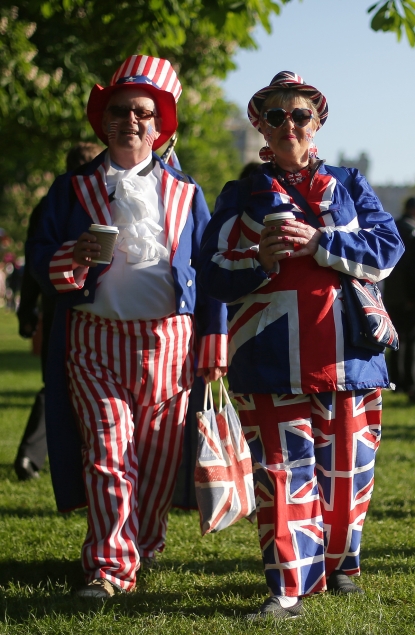 Anglo-American couples everywhere -- well-wishers on the Long Walk leading to Windsor Castle ahead of the wedding. (AFP / Daniel Leal-olivas)
Anglo-American couples everywhere -- well-wishers on the Long Walk leading to Windsor Castle ahead of the wedding. (AFP / Daniel Leal-olivas)Not that I had much choice. Having joined AFP’s London bureau shortly before the couple got engaged, it quickly became clear we’d be covering anything and everything royal wedding related. And justifiably so -- Harry and Meghan’s wedding would be the last major British royal wedding for a generation and the world’s media was hungry for stories. And so we found ourselves chronicling a brewery concocting a "Harry & Meghan's Windsor Knot" ale and marveling at decades of regal memorabilia hoarded in the home of a royal super-fan.
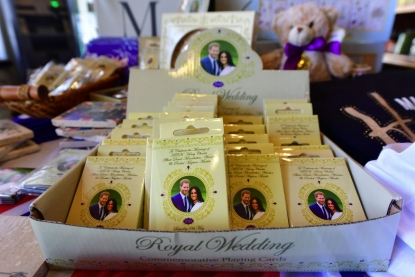 From playing cards in Santa Monica, California.
(AFP / Frederic J. Brown)
From playing cards in Santa Monica, California.
(AFP / Frederic J. Brown)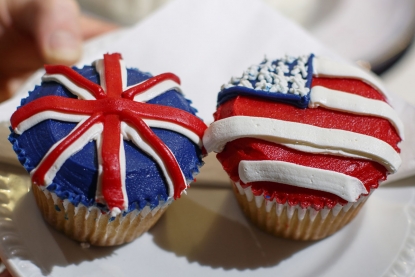 ... to cupcakes in central London.
(AFP / Tolga Akmen)
... to cupcakes in central London.
(AFP / Tolga Akmen)
But this wedding intrigued me and others most because the bride wasn’t the archetypal “English rose” who tends to marry into British royalty. Instead she’s a biracial, divorced American with a successful acting career and a passion for feminism.
Raised in Los Angeles — where I’d lived for the last couple of my years and where I’d met my own wife — it seemed an improbable union of cultures.
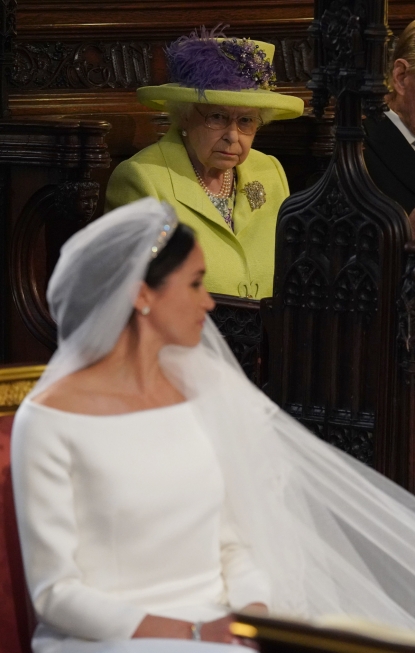 Britain's Queen Elizabeth II looks on during the wedding ceremony of Britain's Prince Harry, Duke of Sussex and US actress Meghan Markle in St George's Chapel, Windsor Castle, in Windsor, on May 19, 2018. (AFP / Pool/Jonathan Brady)
Britain's Queen Elizabeth II looks on during the wedding ceremony of Britain's Prince Harry, Duke of Sussex and US actress Meghan Markle in St George's Chapel, Windsor Castle, in Windsor, on May 19, 2018. (AFP / Pool/Jonathan Brady)Southern California can feel a little dreamy as the hazy late afternoon light dazzles your senses; leaden-skies London can feel a little dreary as the morning rain lashes your face.
Weather aside, if the American dream is coming from nowhere to make your mark on the world through sheer industry, British nobility has often been defined by the opposite, a place where such dreams can easily end in nightmares. Prince William’s overly-privileged pals reportedly used to mock Kate Middleton because her mother once worked as an air hostess, muttering “doors to manual” whenever she’d arrive in their company. I feared what fate might await Meghan.
Although not the first American admitted to Britain’s centuries-old monarchy -- fellow divorcee Wallace Simpson's engagement to King Edward VIII prompted his abdication -- Meghan’s mixed ethnicity and modern background made her marriage to Harry significant — and potentially fraught.
It’s said in America they like to build people up (what is it the Kardashians actually do?), while in Britain they like to knock them down. Already this week a columnist in the traditionalist Daily Telegraph advised readers to “cling onto why we first liked Meghan Markle” because the backlash “is certainly about to begin.”
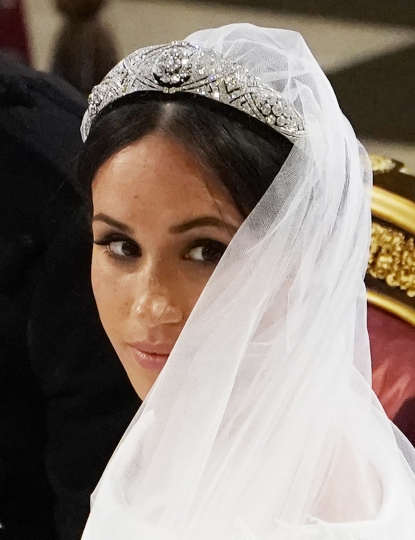 (AFP / Pool/Owen Humphreys)
(AFP / Pool/Owen Humphreys)As the big day finally arrived, amid frenzied anticipation over everything from the colour of the Queen's hat to the royal titles she would bestow on the couple, not everybody was enthusiastic about the nuptials. My sister, a journalist at the lefty Guardian newspaper, refused to partake in any festivities, arguing our attention would be better directed on the more misfortunate around the world caught in conflict.
Raised by parents who proudly proclaimed themselves socialists, I sensed her surprise -- disappointment even? -- at my tolerance for the royal wedding.
Meanwhile I found myself mired in tabloid journalism, as Meghan's family dramas became impossible to ignore in the build-up. Her father pulled out of accompanying his daughter down the aisle after a minor heart attack following an engineered tabloid photo scandal. Her extended family weren’t invited to the ceremony — they were inclined to giving biting interviews — but some showed up in Britain anyway. Then London police confiscated a knife and noxious spray from a half-nephew at his hotel the night of the wedding; he was reportedly spooked by President Donald Trump’s warnings that the capital was “like a war zone”.
At times the whole saga felt like made-for-television drama: Jerry Springer meets The Crown via Suits -- with a splash of televangelism added in a wedding sermon by firebrand American pastor Michael Curry.
Despite some predictably frowning coverage of it all in right-wing newspapers, the British public seemed endeared to the new duchess and sympathetic to her perhaps relatable family woes. This didn't surprise me: Brits can be a compassionate bunch amid such turmoil, as their cherishing of Princess Diana had shown. The consensus here was that Meghan had handled it all with great dignity. Perhaps not a bad way start to playing a royal after all.
The African-American influence on the wedding -- most visible in a rousing all-black gospel choir and Curry's enthusiastic address, which referenced Martin Luther King Jr and slavery -- was seen, by mainstream news reports, as a breath of fresh air in a sometimes-stale institution.
The preacher and the Kingdom Choir from south London certainly enlivened the typically more moribund traditions of Church of England weddings, but it was harder to gauge how people felt about these unconventional (in regal Britain) elements of the ceremony. The crowds watching in Windsor grew perceptibly impatient as the lengthy sermon clocked close to 14 minutes, while a senior church figure later criticised it as "seriously misjudged" and a bid for "world fame."
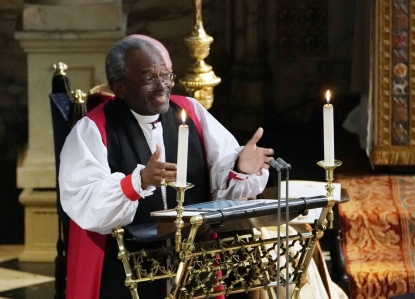 Bishop Michael Bruce Curry during his sermon.
(AFP / Pool/Owen Humphreys)
Bishop Michael Bruce Curry during his sermon.
(AFP / Pool/Owen Humphreys)It had made me unexpectedly nostalgic. I’d heard plenty of African-American pastors deliver lively sermons during my years reporting in the US, when I’d follow white New York politicians headed to black churches courting the congregation’s votes. They’d sway awkwardly to gospel music amid a riot of cacophonous worship before taking a turn at the lecture to proclaim themselves enraptured too.
The royals in the chapel didn’t appear particularly enthralled by Curry, but his sermon was highly significant nonetheless. The royal wedding was such a long way — geographically, culturally, ethnically — from those African-American churches implanted in my memory, it made the ceremony and its place in modern Britain fascinating.
Bernice King, Martin Luther King’s daughter, told BBC radio this week she was surprised but heartened to hear a black preacher quoting a black civil rights leader as a biracial American joined Britain’s bastions of privilege. “There’s so many different symbolisms and messages I think that we’re sent by this union of sorts,” she said. “It is changing, I believe, some of the dialogue in our world today.”
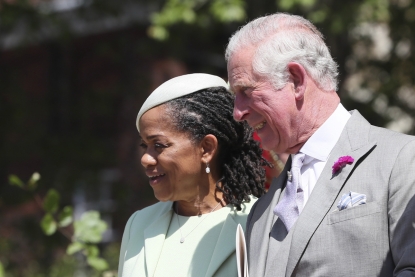 Meghan Markle's mother Doria Ragland (L) and Prince Harry's father Britain's Prince Charles, Prince of Wales (R) leave after attending the ceremony in St George's Chapel, Windsor Castle, in Windsor, on May 19, 2018. (AFP / Pool/Brian Lawless)
Meghan Markle's mother Doria Ragland (L) and Prince Harry's father Britain's Prince Charles, Prince of Wales (R) leave after attending the ceremony in St George's Chapel, Windsor Castle, in Windsor, on May 19, 2018. (AFP / Pool/Brian Lawless)Out reporting in London on the wedding day, I could sense some of that change. At a street party in the traditionally working class East End -- which true to the cosmopolitan face of the modern capital was organised by an American resident and attended largely by non-Brits -- Janet Price told me the ceremony was "different” with Curry’s lengthy sermon but still met her approval. "I think it didn’t go down too well with some of the royals, judging by their faces,” she said with a wry smile.
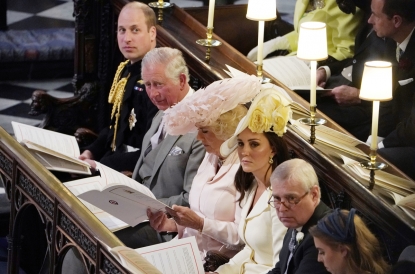 The royal row at the wedding ceremony -- (left to right) Prince William, Duke of Cambridge; Prince Charles, Prince of Wales; his wife Camilla, Duchess of Cornwall; William's wife Catherine, Duchess of Cambridge; Prince Andrew, Duke of York; one of his daughters, Princess Beatrice of York.
(AFP / Pool/Owen Humphreys)
The royal row at the wedding ceremony -- (left to right) Prince William, Duke of Cambridge; Prince Charles, Prince of Wales; his wife Camilla, Duchess of Cornwall; William's wife Catherine, Duchess of Cambridge; Prince Andrew, Duke of York; one of his daughters, Princess Beatrice of York.
(AFP / Pool/Owen Humphreys)For Price, a 69-year-old lifelong Eastender, it evoked memories of her first street party, in 1953 at the tender age of four, celebrating the coronation of Elizabeth II. She’d seen many a royal wedding since — for her always a time for family and community to gather together. Even a self-confessed reformed “militant republican” like local mayor John Biggs saw the value of the royal family, which he reckoned could help not only traditionalists like Price feel British but others in the increasingly multicultural country. “The East End’s a melting pot and we’re pretty good at turning people towards each other,” he told me.
That sentiment was palpable, with countless people telling me they saw the wedding as an opportunity for some much-needed national unity amid Brexit and other political divisions. Even Londoners who might lean republican or ambivalent on the monarchy on other days of the year took up the invitation to celebrate -- though barely any of my friends joined in, and there was always my sister, the royal abolitionist, in noble protest at her hairdresser’s.
In Hackney, a once shabby but now achingly trendy London borough, a trio of Europeans toasted the royal nuptials with sparkling wine amid vintage book and clothing stalls at a street party outside the east London bakery of Claire Ptak, the royal wedding cake maker. "Today we are royalists for sure, tomorrow not anymore," said Gitta Gschwendtner, 46, a longtime German transplant to London.
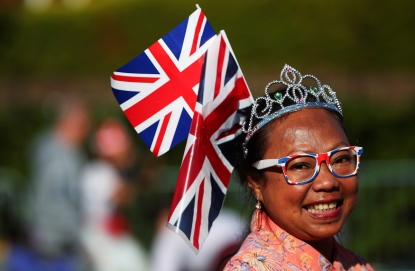 Cheering on the happy couple. (AFP / Hannah Mckay)
Cheering on the happy couple. (AFP / Hannah Mckay)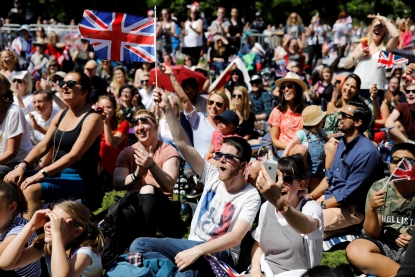 Cheering on the happy couple.
(AFP / Tolga Akmen)
Cheering on the happy couple.
(AFP / Tolga Akmen)
My wife Helen was also in celebratory mood of what she called a modern-day fairytale, with perhaps a streak of national pride creeping in.
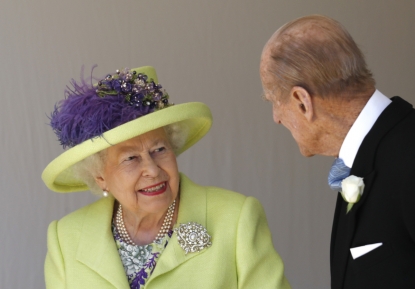 Britain's Queen Elizabeth II talks with her husband, Prince Philip, Duke of Edinburgh, as they leave after the ceremony.
(AFP / Pool/Alastair Grant)
Britain's Queen Elizabeth II talks with her husband, Prince Philip, Duke of Edinburgh, as they leave after the ceremony.
(AFP / Pool/Alastair Grant)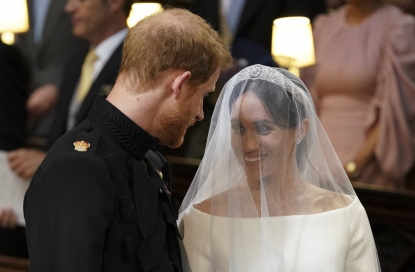 At the altar.
(AFP / Pool/Dominic Lipinski)
At the altar.
(AFP / Pool/Dominic Lipinski)
She’d immigrated to the US from South Korea as a child but was a patriotic American in the way that Americans — immigrant or not — often are without even really being particularly aware of it.
In Britain, with its sullied history of colonial conquest and liking for self-deprecation, shameless patriotism isn’t as common. Royal weddings -- and Brexit votes -- seem the preferred way for expressing nationalism.
For me, I felt a small personal stake in this Anglo-American union. So with the sun having set on the ceremony and our coverage exhausted, I could finally admit it: I’m rooting for Meghan and Harry.
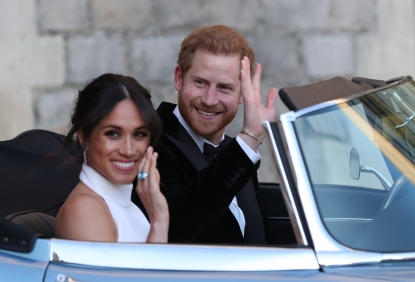 Britain's Prince Harry, Duke of Sussex, (R) and Meghan Markle, Duchess of Sussex, (L) leave Windsor Castle in Windsor on May 19, 2018 in an E-Type Jaguar after their wedding to attend an evening reception at Frogmore House. (AFP / Pool/Steve Parsons)
Britain's Prince Harry, Duke of Sussex, (R) and Meghan Markle, Duchess of Sussex, (L) leave Windsor Castle in Windsor on May 19, 2018 in an E-Type Jaguar after their wedding to attend an evening reception at Frogmore House. (AFP / Pool/Steve Parsons)


